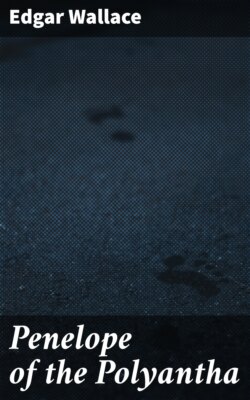Читать книгу Penelope of the Polyantha - Edgar Wallace - Страница 5
На сайте Литреса книга снята с продажи.
III. — THE HOUSE BY THE SEA
ОглавлениеTable of Contents
THE deck steward must have been mistaken, Penelope told herself a thousand times on the journey between Liverpool and London. Of course it was absurd, ridiculous, to suggest that this pleasant man was the head of an infamous gang that preyed upon the foolish. And it was so easy to make a mistake. Mr. Dorban’s type was not an unusual one. Of course it was absurd. Why should a card-sharper want a secretary? Why should he be living in retirement in a Devonshire village, a man of great expectations, of so many business activities that he needed secretarial help?
The greeting between husband and wife had been a perfunctory one; neither seemed especially overjoyed at meeting the other. Mr. Dorban had reserved a compartment and they were alone. Once Penelope wondered whether she should not stroll out into the corridor and allow them to talk by themselves, but at the very first hint of her intentions, Cynthia stopped her.
Mr. Dorban himself was an interesting companion. It seemed to the girl that he talked all the time from the moment the train drew out from the riverside station until it pulled into Euston. His voice was soft and well modulated, his humour subtle, the stories he told excellent.
He had brown eyes, and ordinarily Penelope did not like men with brown eyes, but she thought she could like Mr. Arthur Dorban. Indeed, she felt more at home with him than she had with Cynthia. He knew Canada slightly.
“I have been there once, when I was young, but I hate the sea,” he said. “I would sooner lose ten thousand than cross the Atlantic again.
“Have you crossed many times?” asked the girl curiously.
“Twice,” said Arthur Dorban, with a twinkle in his eye. “If I hadn’t crossed it twice, I shouldn’t have been here, Miss Pitt!”
They spent the night at the Station Hotel in Paddington. Mrs. Dorban hired a car and drove the girl through the Park, and Penelope was amazed and delighted. She had always pictured London as a huddle of squat, dingy brick houses; she was delighted with the Park, with the background of towers and steeples that showed behind the dusky green of the trees, with the silvery stretch of lake, with the multifarious colouring of the flowers, and the noble vista of the Mall.
They left the next morning by an early train for Torquay, and reached Borcombe in time for a late lunch.
Stone House stood on a fold of the green downs at the seaward edge of Borcombe village. A rambling house, invisible from the red cliffs above, and half hidden by the belt of sycamores from the beach below, it had been built at the end of the eighteenth century by a recluse who, for his own private reason, desired isolation from the world.
The house was approached by a steep narrow road that wound down the face of the cliff, and its consequent inaccessibility had been a grievance to generations of tradesmen.
To Pen it was a paradise. The sloping garden was a kaleidoscopic tangle of flowers, wild and cultivated. At the lower end of the garden, hidden by a continuous hedge of lilac, was a brick wall pierced by one ancient door which led to a private path (it was less of a path than a series of stone steps terminating in a broad, weather-worn rock) to the shed where Mr. Dorban’s stout motor-boat was moored. The span of the shed ran between two flat rocks, and Nature had thus created an ideal quay, for the boathouse was sited in the hollow of a tiny bay, and was protected from stormy seas by two short reefs that jutted straightly into the sea, forming a natural breakwater.
“Delightful, isn’t it?” said Cynthia mechanically.
It seemed that her interest in such things was invariably mechanical. Her mind was so completely occupied by the practical things of life, the bread and the butter of it.
“Yes. It is a long way from the village, but I have a car which saves the climb. Can you drive?”
Penelope nodded.
“Now you had better see your room,” said Cynthia, and led the way up a broad flight of stairs, down a long and dark passage, to a room at the end.
It was small and simply furnished, but it had two windows which looked out upon the emerald and amethystine sea, upon the red cliffs and the green fields atop.
She drew a deep breath.
“Do you like it?” asked Cynthia, watching her closely.
“It is lovely,” she breathed.
Mrs. Dorban laughed shortly.
“It is my idea of hell,” she said.
